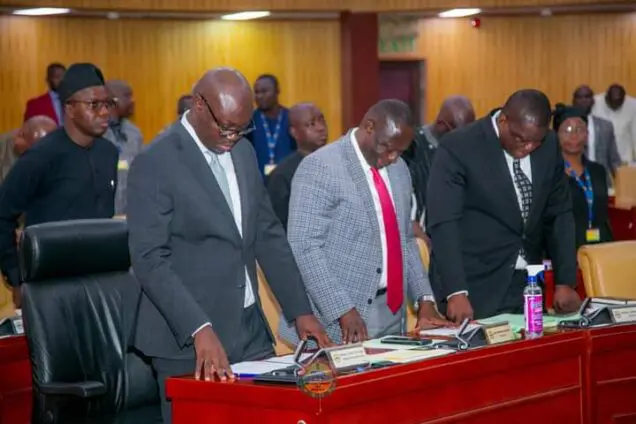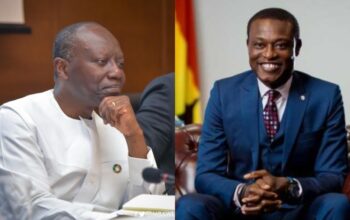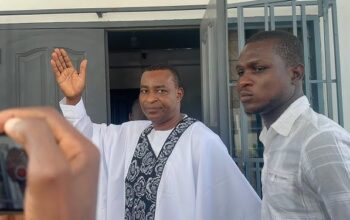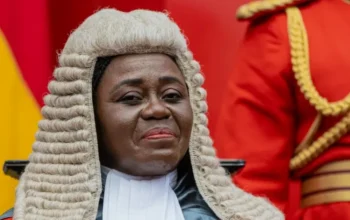The NDC Majority Caucus in Ghana’s Parliament has urged the Speaker, Alban Bagbin, to reject the recall request made by Members of Parliament (MPs) from the New Patriotic Party (NPP). The memo, submitted on November 25, 2024, and signed by Dr Cassiel Ato Forson, the leader of the Caucus, contended that the NPP MPs’ request did not meet the necessary constitutional and procedural standards required under Article 112(3) and Standing Order 53(1) of Parliament.
Dr Forson emphasised that the NPP’s request for a recall lacked the required threshold, which would make the call for a special sitting of Parliament invalid. The NDC Caucus maintains that the request should be dismissed based on these grounds. The procedural disagreement adds to the political tensions in Ghana’s Parliament, where the opposition and ruling party have frequently been at odds over legislative and constitutional issues. The NDC Majority Caucus in Parliament has objected to a recent recall request submitted by NPP MPs. In their argument, they assert that the request does not comply with the necessary constitutional and procedural requirements.
Article 112(3) of the Constitution sets out the specific procedures for the recall of Parliament, which involves a clear set of conditions that must be met before a special sitting can be convened. This includes a requisite number of MPs or a certain threshold of parliamentary support to initiate such a process. Standing Order 53(1) of Parliament further outlines the internal procedural steps for recalling MPs and the conditions under which the Speaker can call for a sitting.
The NDC Caucus, led by Dr. Cassiel Ato Forson, is challenging the validity of the NPP’s recall request on the grounds that it does not meet these requirements. It is seeking to prevent the Speaker from moving forward with the request.
This development is part of a broader political context where the opposition party (NDC) and the ruling party (NPP) continue to dispute legislative matters, procedural challenges, and governance issues.
Dr. Cassiel Ato Forson, leader of the NDC Majority Caucus, strongly emphasized that any request for a recall of Parliament must meet specific legal and procedural criteria. He argued that the NPP MPs’ request did not fulfill these necessary requirements, particularly highlighting that the required threshold for such a recall had not been reached.
In his memo, Dr Forson pointed out that the Speaker of Parliament, Alban Bagbin, holds the discretion to either approve or reject the recall request. He urged Speaker Bagbin to use his judgment and reject the petition, stressing that the NPP’s call for a reconvening of Parliament was inconsistent with the standing orders of Parliament. Dr Forson also questioned the urgency of the request, asserting that there were no compelling reasons to warrant the immediate reconvening of Parliament.
The NDC Caucus’ objection is rooted in ensuring that any parliamentary processes, including recalls, strictly adhere to constitutional and procedural norms, and that these mechanisms are not used for political manoeuvrings. The dispute adds to ongoing tensions between the NDC and NPP, with both parties often at odds over parliamentary procedures and governance issues. The NDC Majority Caucus’s objection to the NPP MPs’ recall request comes at a time when tensions between the two main political parties in Ghana’s Parliament, the National Democratic Congress (NDC) and the New Patriotic Party (NPP), have been intensifying. The NPP MPs had called for the recall of Parliament, seeking an urgent reconvening of the House, but Dr. Cassiel Ato Forson and the NDC Caucus argue that the conditions for such a recall have not been met.
Dr. Forson emphasized that, according to Article 112(3) of the Constitution of Ghana, and the Standing Orders of Parliament, there are clear guidelines that must be followed for a valid recall. This includes meeting a specific threshold in terms of the number of MPs who must support the recall for it to proceed. The NDC Caucus argues that the NPP MPs’ request did not meet the required criteria, and therefore, it should not be entertained by Speaker Bagbin.
According to Article 112(3), Parliament can be recalled during recess only under certain conditions, one of which is that at least one-quarter of the total membership of Parliament (i.e., 75 MPs) must sign the request for a recall. The NDC Caucus argues that the NPP MPs did not meet this threshold in their request. The Standing Order 53(1) outlines the procedures for calling Parliament into session outside of its regular sittings. The NDC Caucus has pointed out that the NPP’s request fails to adhere to these procedural rules, including failing to justify why the recall is urgent or necessary.
Dr. Forson also emphasized the role of Speaker Alban Bagbin in this matter. The Speaker is vested with the discretion to determine whether a recall is valid, based on the requirements set out in the Constitution and Parliament’s standing orders. Dr Forson’s memo implores Speaker Bagbin to reject the NPP MPs’ request, stating that the petition lacks sufficient grounds for a special sitting and that its approval could undermine the legislative process.
The political context of this disagreement is important to understanding the motivations behind it. The NPP, as the ruling party, may seek to reconvene Parliament to push through certain urgent legislative measures, possibly related to the budget, national policies, or other key issues. On the other hand, the NDC, as the opposition, sees this as an opportunity to challenge the ruling party’s agenda and to assert its authority within Parliament. The procedural dispute is part of a broader pattern of political gridlock and manoeuvring between the two parties in recent years.
In conclusion, the NDC Majority Caucus is making a strong case for adherence to constitutional and parliamentary processes, urging the Speaker to reject the NPP’s recall request on procedural grounds. The outcome of this dispute could have implications for the functioning of Parliament and the relationship between the ruling and opposition parties. The memo from the NDC Majority Caucus, led by Dr. Cassiel Ato Forson, presents a strong objection to the recall request made by NPP MPs. It emphasizes that Speaker Alban Bagbin is not required to recall Parliament based on the petitioner’s request alone, particularly since the legal and procedural conditions have not been met.
The petition, according to the NDC, does not impose an obligation on the Speaker to recall Parliament. The request, as submitted by the NPP MPs, fails to meet the necessary criteria outlined in the Constitution and standing orders of Parliament. The memo suggests that the Speaker has discretion and is not compelled to act on this petition. Another key point raised in the memo is the lack of demonstrated urgency. The NPP MPs had argued that there were critical government matters requiring immediate attention. However, the NDC argues that the petition fails to show any emergency or pressing business that would justify reconvening Parliament so close to the general election (which is set to take place in less than two weeks from the date of the petition). The NDC sees no valid reason to call Parliament back early, particularly as the country is on the brink of elections.
On November 22, 2024, the NPP MPs submitted a formal petition to Speaker Bagbin requesting the immediate recall of Parliament. They argued that urgent government business needed to be addressed before the general election. However, this petition has been met with scepticism and legal challenges from the NDC Caucus, which claims that the request lacks both procedural validity and a compelling reason for immediate action.
The NDC’s response, led by Dr Forson, reflects the opposition’s stance on the matter. They view the NPP’s recall request as a politically motivated manoeuvre, one that may be intended to push through legislation or other government priorities in the final days before the election. Dr. Forson’s memo argues that there is no need to disrupt the parliamentary schedule, especially when the 2024 elections are approaching, and Parliament is set to adjourn in the coming days.
In summary, Dr Forson’s memo questions both the necessity and the legal foundation of the NPP MPs’ petition for a recall, urging Speaker Bagbin to reject it. The memo highlights the approaching elections and the lack of an urgent governmental need as key reasons why Parliament should not be recalled. The dispute reflects ongoing political tensions in Parliament between the ruling NPP and the opposition NDC.









